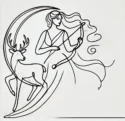Justice, Justice Thou Shalt Pursue by Ruth Bader Ginsberg and Amanda L. Tyler
Overarching Plot: ⭐️⭐️⭐️⭐️/5
Character Development: ⭐️⭐️⭐️/5
Flow: ⭐️⭐️⭐️⭐️/5
Theme: ⭐️⭐️⭐️⭐️/5
Writing Style: ⭐️⭐️⭐️⭐️/5
Emotional Resonance: ⭐️⭐️⭐️⭐️/5
They called her Notorious RBG. I always loved that. Someone in such an elite part of America made an icon in pop culture. She had buttons and stickers. They called her a gangster. You don’t often see that.
When people try to name someone on the Supreme Court, I’d bet 9 out of 10 of them say Justice Ginsberg. But if you were to ask them what made her so famous, so notorious? I’d bet only 4 would give you a good answer. (This is of course assuming they can name any at all — and we’ve all seen those on-the-street history questions enough to know how likely that is).
I should also acknowledge that before reading this book, I don’t think I could have given a good answer as to the why either. I knew she was important. She was a trailblazer in the feminist movement. But why? By the time I came into political consciousness, RBG was quite old. I was 22 when she died. That’s not much time to understand a person’s character and the way they interact with the public.
I bought this book a year or so after her passing because I wanted to understand. This was the last book she wrote and it was to be the summation of her thoughts and her greatest moments on the bench. I knew I would learn, but I didn’t expect to learn so much.
My favorite piece of information may be that RBG was most famous for her Supreme Court dissents. RBG did a lot for equality, not only in her own work but in the way she inspired other people to fight for better. She pushed the needle towards a fairer society; yet she was not satisfied with it. Not in a desperate, hopeless way; rather, in a “there’s more work to be done” way. This recognition is quite daunting in today’s political climate because it is quite clear that some think we have gone too far. They couldn’t be more wrong.
What I have learned makes RBG so important, so special, was her way of thinking, her perseverance, and her fearless way of looking prejudice in the eye and never blinking. I look back on it all now and there are times I’m quite mad at her. If she had only retired, what a different world we’d live in. But this is the way it is now. The best we can do is learn from what she taught, whether she wanted to teach the lesson or not.
She was 39 when she argued her first case. Not that she didn’t want to do it before this, but she found it impossible. She was a wife, a mother, a teacher, a scholar, and a true keeper of law and order. But she wasn’t the first of her kind. She was brilliant and dedicated, but the law firms had filled their “woman lawyer” quota. It didn’t matter that she graduated top of her class, raising a baby at the same time, or that her husband got cancer while they were in law school so she attended both of their classes. She wasn’t special enough.
Isn’t that incredible? You could do everything they say you have to, work harder than anyone else, do better than anyone else, be absolutely perfect all the time — it doesn’t matter if they don’t want to see it. Her qualifications didn’t matter because they already made up their minds about what a woman had to offer the law firm.
For a time, RBG resigned herself to this. She taught at Rutgers, creating the next generation of lawyers who would change the world. That is until her husband saw an opportunity for her to be the one to say something no one else had. This is what became RBG’s magic. She wasn’t the first of her kind. There were plenty already putting up a fight. But RBG found the openings, she found the spots that needed attention. She saw weak points in the system, broke what needed to break, and rebuilt them better.
She didn’t just see the way things were, she saw what they could be, what they should be. She spent her whole life fighting. And while there are things I wish she had done differently, I can’t help but admire her dedication, determination, and focus.
Maybe this was just a me thing, but the title of the book confused me for a long time. It didn’t make sense. I thought maybe it’d be better as “Justice shall be pursued” or “I shall pursue Justice.” The wording felt odd to me — until I realized that Justice was doing the pursuing. The line comes from Deuteronomy 16:20; chapter 16 of Deuteronomy tells the Israelites how to observe Passover and verses 18-20 gives guidance on the role of Judges in society, which makes it all the more reasonable when the other author of the book, Amanda Tyler, explains that Justice Ginsberg had the phrase hanging up in her office.
Justice does not change. Justice pursues us. It is our responsibility to acknowledge it and make sense of it. It is our responsibility to make our system reach towards the stationary place where Justice lives, not warp and twist the idea of Justice to fit our way of living. And as history has shown, Justice always catches up to us.

